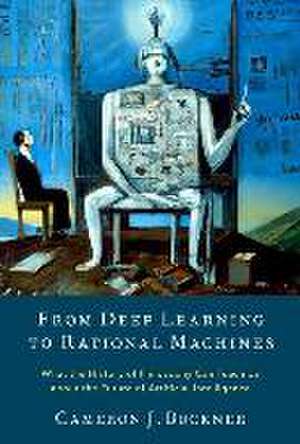From Deep Learning to Rational Machines: What the History of Philosophy Can Teach Us about the Future of Artificial Intelligence
Autor Cameron J. Buckneren Limba Engleză Hardback – 15 feb 2024
Preț: 157.87 lei
Preț vechi: 179.38 lei
-12% Nou
Puncte Express: 237
Preț estimativ în valută:
30.22€ • 32.83$ • 25.40£
30.22€ • 32.83$ • 25.40£
Carte disponibilă
Livrare economică 20-26 martie
Livrare express 15-21 martie pentru 53.80 lei
Preluare comenzi: 021 569.72.76
Specificații
ISBN-13: 9780197653302
ISBN-10: 0197653308
Pagini: 440
Dimensiuni: 152 x 198 x 56 mm
Greutate: 0.58 kg
Editura: Oxford University Press
Colecția OUP USA
Locul publicării:New York, United States
ISBN-10: 0197653308
Pagini: 440
Dimensiuni: 152 x 198 x 56 mm
Greutate: 0.58 kg
Editura: Oxford University Press
Colecția OUP USA
Locul publicării:New York, United States
Recenzii
AI, in the form of in deep learning, is emerging as one of the most transformative technologies of our time. Cameron Buckner provides an extremely useful framework for assessing its contributions and pitfalls. He frames debates over deep learning in terms of the history of philosophical debates between empiricism and rationalism and develops and defends a moderate empiricism that offers an illuminating perspective from which to understand and evaluate the claims and counterclaims about AI's prospects. Non-AI researchers will acquire valuable tools for engaging AI while AI researchers will find insightful suggestions for advancing their endeavor.
This terrific book is packed full of insights. Based on a deep understanding of deep neural networks, it showcases a variety of ways in which these computational models illuminate aspects of the human mind. Buckner's conclusions will be of interest to researchers from across the cognitive sciences. His accessible treatment will also be useful to philosophers more broadly—in any field—who want to understand what's important about this revolutionary new technology.
It is both exciting and alarming that areas once considered the exclusive zone of human rationality are rapidly being conquered by new forms of artificial intelligence. The astonishing success of deep neural networks, in everything from strategic gaming to natural language, raises questions about whether these new machines are rational, and whether we are at some level similar machines ourselves. For anyone searching for answers to such questions, Cameron Buckner is your best possible guide: he delivers a clear explanation of the crucial technical features of contemporary AI, together with a profound philosophical analysis of the relationship between innate structure and experience. This book marks a new stage in the human understanding of rationality.
Philosophers who are interested in deep learning and deep learning researchers who are interested in philosophy are natural audiences for Buckner's book. Both will find much of interest and value in it.
This terrific book is packed full of insights. Based on a deep understanding of deep neural networks, it showcases a variety of ways in which these computational models illuminate aspects of the human mind. Buckner's conclusions will be of interest to researchers from across the cognitive sciences. His accessible treatment will also be useful to philosophers more broadly—in any field—who want to understand what's important about this revolutionary new technology.
It is both exciting and alarming that areas once considered the exclusive zone of human rationality are rapidly being conquered by new forms of artificial intelligence. The astonishing success of deep neural networks, in everything from strategic gaming to natural language, raises questions about whether these new machines are rational, and whether we are at some level similar machines ourselves. For anyone searching for answers to such questions, Cameron Buckner is your best possible guide: he delivers a clear explanation of the crucial technical features of contemporary AI, together with a profound philosophical analysis of the relationship between innate structure and experience. This book marks a new stage in the human understanding of rationality.
Philosophers who are interested in deep learning and deep learning researchers who are interested in philosophy are natural audiences for Buckner's book. Both will find much of interest and value in it.
Notă biografică
Cameron J. Buckner is an Associate Professor in the Department of Philosophy at the University of Houston. He received an Alexander von Humboldt Postdoctoral Fellowship at Ruhr-University Bochum from 2011 to 2013 and has been a visiting fellow at the University of Cambridge.
